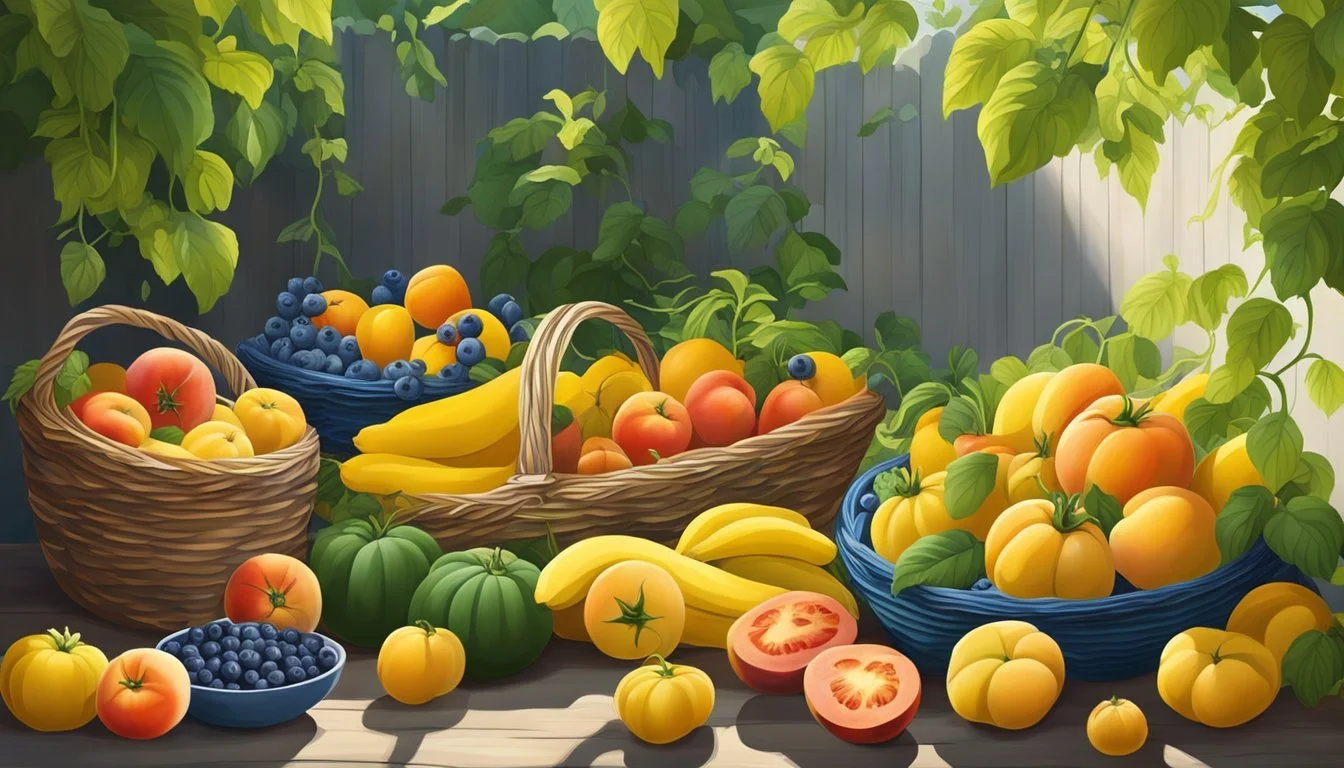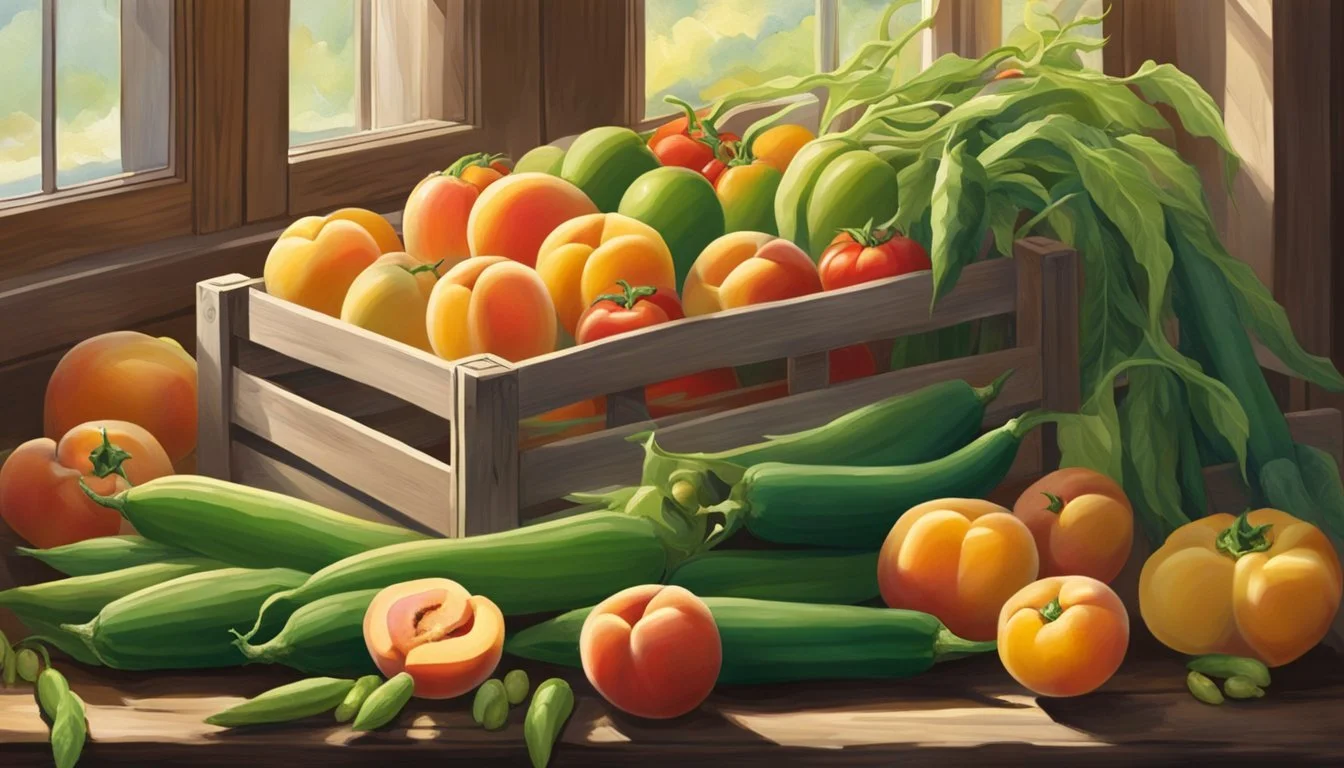Tennessee Seasonal Fruit & Vegetables in July
Your Fresh Guide
This Article is Part of our Tennessee Seasonal Fruit & Veg Calendar
July in Tennessee brings a bounty of fresh produce as many fruits (What wine goes well with fruit?) and vegetables reach their peak in the warm, southern climate. The state's rich soil and diverse climate conditions contribute to a variety of harvests across its regions, from the rolling hills to the fertile valleys. During this month, local farms and farmers markets brim with vibrant colors and fresh flavors, offering a feast for the senses and a boon for those seeking to incorporate seasonal ingredients into their cooking.
The summer month of July is particularly lush, with an array of produce that includes juicy tomatoes, crisp cucumbers (how long do cucumbers last?), and sweet corn, all staples of Southern cuisine. Fruit lovers can rejoice in the availability of fresh blueberries (how long do blueberries last?), plump and bursting with flavor, as these are true seasonal gems. The Tennessee agricultural calendar is tailored to the rhythm of the seasons, ensuring that consumers have access to the freshest, most flavorful produce available.
When selecting fruits and vegetables in Tennessee during July, shoppers can expect to find produce that not only tastes better but also has a higher nutritional content due to its freshness. Embracing the season's offerings not only supports local agriculture but also provides an opportunity to explore new recipes and savor the tastes of summer at their peak.
Seasonal Overview
July in Tennessee marks a high point in the growing season, where weather conditions and harvest periods converge to bring a wide array of produce to its peak availability.
Weather Impact on Produce
The weather in Tennessee in July is typically warm and often humid, which is conducive to the growth of many fruits and vegetables. These conditions accelerate ripening and increase the sweetness of many summer fruits. The month’s ample sunlight and warm temperatures are ideal for the maturation of produce, but they also require careful monitoring to prevent overheating and drought stress. Irrigation during dry spells is key to maintaining healthy crops.
Harvesting Periods
The harvesting periods in July for Tennessee's seasonal produce are well-defined due to the consistent summer climate. Many popular fruits and vegetables reach their peak and are harvested during this month:
Fruits:
Blackberries (how long do blackberries last?)
Blueberries
Raspberries
Watermelon
Cantaloupe (how long does cantaloupe last?)
Vegetables:
Summer squash
Tomatoes
Zucchini (What wine goes well with zucchini?)
Farmers and gardeners diligently track the season's progression to optimize harvest times, ensuring the freshest and most flavorful produce is available for markets and consumption.
Fruit Highlights of July
July in Tennessee is a peak season for a variety of fruits, providing an abundance of options ranging from sweet berries to succulent stone fruits and refreshing melons.
Berries Galore
In Tennessee, July sees berries at their peak of freshness. The most prominent are blueberries, which are widely available and at their juiciest. Blackberries also thrive during this month, offering a sweet yet slightly tart flavor profile. Berry lovers can indulge in these fruits at their freshest, as they are staples of the local farmers markets.
Blueberries: Peak season June-August
Blackberries: Abundant in July
Stone Fruit Selection
Peaches represent the essence of summer stone fruits and are in their prime in July. Tennessee's climate allows for a range of peach varieties, each with its own unique taste and texture, from clingstones to freestones. These peaches are perfect for fresh eating or in desserts.
Peaches: Various varieties ripe for picking
Melon Availability
Nothing quite matches the refreshment of melons on a hot July day. Watermelon and cantaloupes are becoming increasingly prevalent during this time. They are enjoyed for their hydrating properties and sweet, cooling flavors, making them ideal for picnics and outdoor gatherings.
Watermelon: Sweet and hydrating
Cantaloupes: A fragrant and sweet variety of melon
Other Seasonal Fruits
Aside from the more common summer fruits, other varieties that come into season include plums and raspberries. The state's fruit orchards begin to buzz with activity as these fruits achieve their ideal ripeness.
Raspberries: A less common but delightful berry
Other Fruits: Additional varieties such as plums join July's fruit offerings
By taking advantage of Tennessee's July fruit bounty, individuals can enjoy the freshest and most flavorful produce direct from local farms.
Vegetable Highlights of July
July in Tennessee heralds the peak time for a variety of vegetables, where the warm climate sets the stage for a bountiful harvest. The month's offerings are diverse, ranging from leafy greens to the robust flavors of nightshades.
Leafy Greens and Cruciferous Vegetables
Tennessee's July gardens are flush with leafy greens including varieties of lettuce which can tolerate the state's summer heat. Spinach and kale also continue to do well during this time, providing a continuous harvest. One can find a selection of cruciferous vegetables like cabbage brimming in local markets, an ideal ingredient for summer coleslaws and salads.
Lettuce: Butterhead, Boston, Loose Leaf
Spinach
Kale
Cabbage
Nightshades and Gourds
July is prime time for nightshades such as tomatoes, eggplants (What wine goes well with eggplant?), and peppers, all of which thrive in Tennessee's warm summer soil. Due to the long growing season, various types and sizes—from cherry tomatoes to large heirlooms—are available. Additionally, summer gourds like squash and cucumbers are abundant, perfect for grilling or pickling.
Tomatoes: Cherry, Heirloom, Beefsteak
Eggplant
Peppers: Bell, Jalapeño, Banana
Squash
Cucumbers
Root Vegetables and Legumes
Root vegetables such as carrots and beets reach their peak in July, offering vibrant colors and sweetness, heightened by the summer sun. Legumes like beans, including snap beans and pole beans, are also ready for harvest, adding crunch and variety to the summer plate.
Carrots
Beets
Beans: Snap Beans, Pole Beans
Other Seasonal Vegetables
Beyond the familiar favorites, July in Tennessee brings a variety of additional vegetables. Gardeners and farmers market aficionados can expect a mix of specialty items that can elevate any summer dish.
Okra
Zucchini
Corn
Each of these vegetables can be enjoyed fresh from the garden or incorporated into a wide range of recipes that celebrate the tastes of summer.
Local Farming and Gardening
Tennessee's rich agricultural landscape is profoundly shaped by its varied climate and hardiness zones which directly influence the thriving diversity of crop varieties grown in the state.
Tennessee's Diverse Climate
Tennessee enjoys a climate that varies greatly from the mountainous east to the flatter western regions. This diversity in weather patterns allows for a wide range of fruit and vegetable crops. In July, the warm summer temperatures coupled with moderate rainfall create ideal conditions for growing an extensive assortment of produce.
Hardiness Zones and Crop Varieties
Tennessee is primarily spread across Hardiness Zones 6a through 7b, with a small portion in 8a. This segmentation helps gardeners and farmers determine which plants are most likely to thrive in their specific location. Crops such as tomatoes, sweet corn, and cucumbers, as well as fruits like peaches, are well-suited to these zones and are typically harvested in July.
Vegetables: Tomatoes, sweet corn, cucumbers
Fruits: Peaches, blueberries, blackberries (how long do blackberries last?)
Local farms often plan their planting schedules to maximize the yield during the peak growing months, and Tennessee's July harvest reflects the careful selection of crops adapted to the midsummer's climate conditions.
Preparing and Preserving July Harvest
In July, Tennessee's gardens brim with fresh produce, making it a crucial time to understand how to handle the bounty. This section guides you through ways to enjoy July's harvest immediately, as well as preservation methods to extend the enjoyment year-round.
Fresh Consumption
The key to enjoying July's harvest at its freshest is knowing which fruits and vegetables are in season. In Tennessee, the month of July offers an abundance of foods like tomatoes, raspberries, summer squash, watermelon, and zucchini. They are best consumed within days of harvest to maintain crispness and flavor.
Preservation Techniques
A variety of methods can keep the essence of July alive throughout the year:
Freezing: Berries, squash, and beans are suitable for freezing. They should be washed, dried, and spread on baking sheets to freeze individually before being transferred to airtight containers.
Canning: Tomatoes can be canned as sauces or salsas. Ensure proper acidity and follow safety guidelines closely to prevent food spoilage.
Drying: Herbs and peppers are ideal candidates for drying. Lay them out in a dry, well-ventilated space, or use a dehydrator to preserve their flavors.
Culinary Applications
Incorporating July's produce into recipes not only diversifies meal plans but also adds nutritional value:
Recipes: Fresh tomatoes and zucchini can be turned into refreshing salads, sauces, or stuffed vegetable dishes.
Jams: Berries and peaches from July's harvest can be made into jams. The jam-making process involves cooking down the fruit with sugar until it reaches a gel-like consistency.
Pickles: Cucumbers can be pickled using vinegar, water, and herbs to create both quick pickles and canned pickles for longer storage.
Health Benefits of Seasonal Eating
Eating fruits and vegetables at the peak of their season not only offers better flavor but also maximizes health benefits. They are looking to gain heightened nutrition and to support the body's needs according to the season.
Nutritional Advantages
Consuming seasonal produce ensures they are getting fruits and vegetables when their nutrient content is at its highest. For example, leafy greens harvested in the summer, such as spinach and kale, are packed with essential vitamins and minerals. These dark green vegetables are rich in vitamins A, C, E, and K, and they provide minerals like iron and calcium. Fruits like berries offer high levels of antioxidants during their peak season.
Vitamin Content: Peak season fruits and vegetables contain more vitamins.
Antioxidants: Seasonal produce like berries are rich in compounds that combat oxidative stress.
Seasonal Health Considerations
During July in Tennessee, the body can benefit from the hydration that seasonal fruits provide due to the summer heat. The dietary fiber in seasonal produce promotes a healthy digestive system. Moreover, many summer fruits and vegetables, such as tomatoes and bell peppers, are high in water content, which is essential during hot months. They also contain phytonutrients that help protect the skin from sun damage, an important consideration during long summer days.
Hydration: Seasonal fruits like cucumbers and melons assist in keeping the body hydrated.
Skin Protection: Tomatoes, rich in lycopene, may provide some protection against UV rays.
Community and Economic Impact
The month of July marks a vital period in Tennessee for local produce markets and agritourism activities which directly influence the state's economy and community engagement.
Farmers Markets and Direct Sales
In Tennessee, farmers markets serve as critical economic hubs, particularly in July when an array of fresh fruits and vegetables harvested locally are at their peak. These markets empower local farmers to sell directly to consumers, reducing the supply chain costs and fostering a connection between producers and the community. For the state, this direct selling translates to fewer transportation emissions and supports the local economy by keeping money within local circulation. Direct sales at farmers markets incentivize farmers to diversify their offerings and capture the full retail value, which can lead to increased financial stability.
Economic Advantages:
Supports local small farm businesses.
Reduces transportation and distribution costs.
Encourages the circulation of money within the community.
Community Impact:
Provides access to fresh, seasonal produce.
Facilitates farmer-consumer relationships.
Enhances community engagement.
Agritourism Activities
Agritourism in Tennessee, which includes attractions such as pumpkin patches and corn mazes, peaks during July as they leverage the summer's bounty to draw visitors. These activities not only boost the state's economy by attracting tourists but also provide educational and entertainment value, showcasing Tennessee's agricultural heritage. The introduction of these attractions helps diversify farmers' incomes and promotes the agriculture sector's sustainability. Agritourism also nurtures a sense of community by turning farms into local destinations, where families and individuals can engage with farming activities and enjoy the seasonal offerings.
Economic Impact:
Diversifies farmers' revenue.
Attracts tourists, supporting wider local businesses such as hospitality and retail.
Community Engagement:
Offers educational experiences about farming and food production.
Provides family-centric activities, strengthening community bonds.






